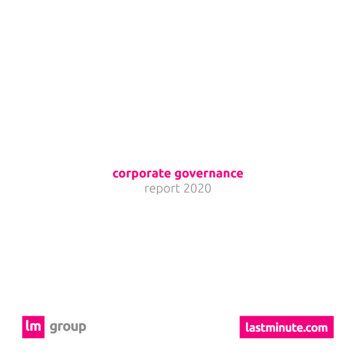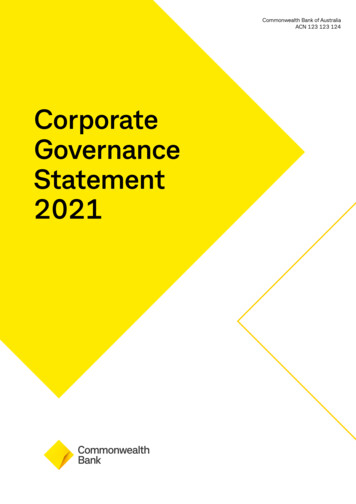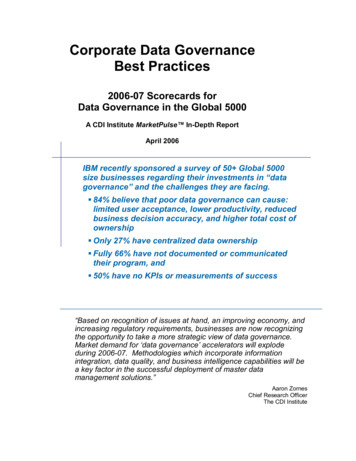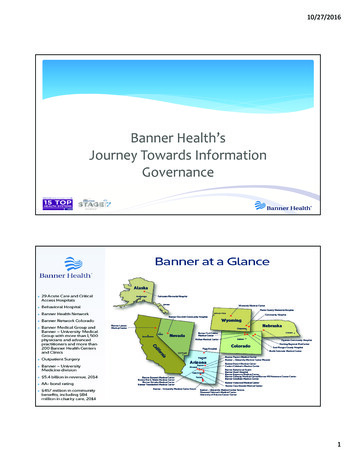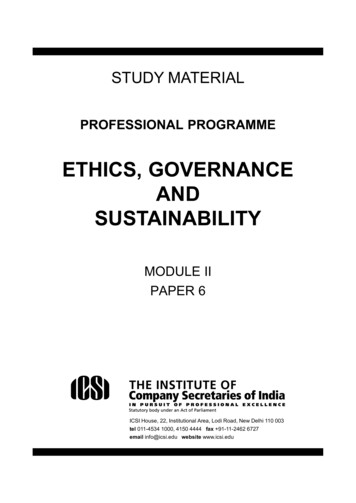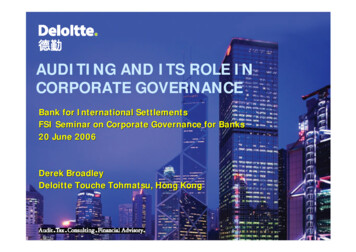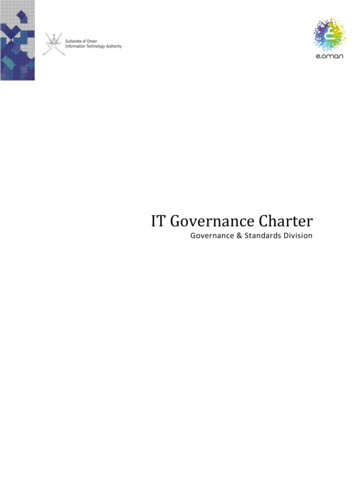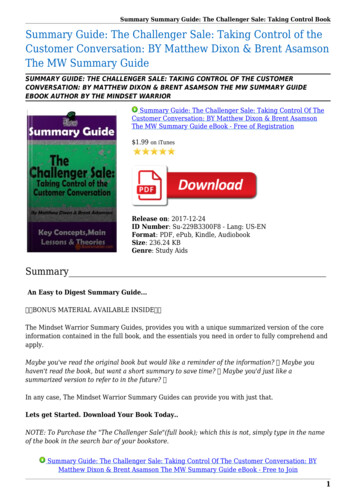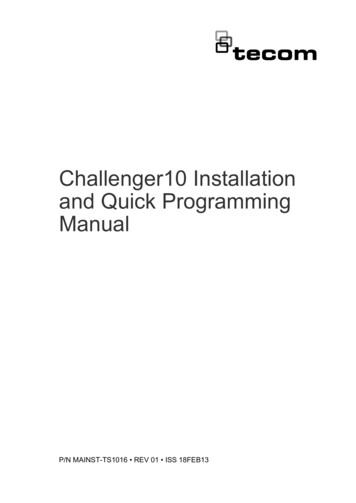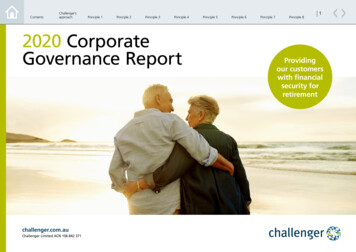
Transcription
ContentsChallenger’sapproachPrinciple 1Principle 2Principle 3Principle 42020 CorporateGovernance Reportchallenger.com.auChallenger Limited ACN 106 842 371Principle 5Principle 6Principle 7Principle 8 1Providingour customerswith financialsecurity forretirement
ContentsChallenger’sapproachPrinciple 1Principle 2Principle 3Principle 4Principle 5Principle 6Principle 7Principle 8 2Contents03 Challenger’s approach04 Principles andRecommendations04 Principle 1 – Lay solid foundationsfor management and oversight07 Principle 2 – Structure the Boardto be effective and add valueKey dates2020 Annual General Meeting9 February 2021Half-year financial results11 Principle 4 – Safeguard theintegrity of corporate reports23 March 2021Interim dividend payment date12 Principle 5 – Make timely andbalanced disclosure10 August 2021Full-year financial results14 Principle 7 – Recognise andmanage risk15 Principle 8 – Remunerate fairlyand responsibly2020 SustainabilityReportThe 2020 Corporate GovernanceReport is available online at:The 2020 Sustainability Report outlinesChallenger’s approach to addressingenvironmental, social and governancerisks and opportunities. It also trackskey achievements in the delivery ofChallenger’s sustainability strategy.The 2020 Sustainability Report isavailable online at:› challenger.com.au/corporategovernance202029 October 202010 Principle 3 – Instil a culture ofacting lawfully, ethically andresponsibly13 Principle 6 – Respect the rights ofsecurity holdersCorporate GovernanceReport22 September 2021Final dividend payment date28 October 20212021 Annual General MeetingDates may be subject to change.Any change in dates will be advised to theAustralian Securities Exchange.2020 Annual ReviewThe 2020 Annual Review provides usefulinformation about Challenger and itsfinancial performance in an easy-to-readformat. The Annual Review includesa performance update, a report fromthe Independent Chair and the ChiefExecutive Officer, and information onChallenger’s approach to environmental,social and governance matters.The Annual Review is available online at:› challenger.com.au/annualreport20202020 Annual ReportThe 2020 Annual Report, includingthe financial report for the year ended30 June 2020, is available online at:› challenger.com.au/annualreport2020Challenger Limited 2020 Corporate Governance Report› challenger.com.au/sustainabilityreport20202020 Annual GeneralMeetingDate29 October 2020Time9.30am (Sydney time)Full details of the meeting will beincluded in the Notice of AnnualGeneral Meeting, which will be sent toshareholders in September 2020.
ContentsChallenger’sapproachPrinciple 1Principle 2Principle 3Principle 4Principle 5Principle 6Principle 7Principle 8 3Challenger’s approach to corporate governanceThe Board of Directors (Board) and ChallengerLimited (Challenger) are committed toimplementing and maintaining a robust corporategovernance system. Challenger believes thatcorporate governance adds value to its businessand enhances stakeholder confidence.The Board determines the most appropriate corporate governancepractices for Challenger and its controlled entities (Group), takinginto consideration Australian and international standards andthe prudential requirements of regulators such as the AustralianPrudential Regulation Authority and the Australian Securities andInvestments Commission.This Corporate Governance Report reports against the CorporateGovernance Principles and Recommendations (4th edition)published by the Australian Securities Exchange’s (ASX) CorporateGovernance Council in 2019 (Principles). As part of Challenger’scommitment to contemporary corporate governance practice,where possible, the Board has adopted a number of the ASX’srecommendations before they come into effect for financial yearscommencing from 1 July 2020.This report applies to Challenger; however, some controlled entitieshave adopted additional policies and procedures to manage specificissues relevant to their businesses, for example Australian FinancialServices Licence compliance.Challenger’s Corporate Governance Report has been approved by theBoard and is current as at 30 June 2020.ShareholdersChallenger Limited BoardActs on behalf of shareholders and oversees the overall direction,management and corporate governance of ChallengerAudit CommitteeOversight ofreporting requirementsRisk CommitteeOversight of riskmanagement frameworkNomination CommitteeAssists the Board achieve effectivecomposition and sizeChief Executive OfficerResponsible for the day-to-day management of Challengerand the implementation of its strategic objectivesLeadership TeamDelivery of strategic objectivesEmployeesChallenger Limited 2020 Corporate Governance ReportRemuneration CommitteeOversight of remunerationpolicies and practices
ContentsChallenger’sapproachPrinciple 1Principle 2Principle 3Principle 4Principle 5Principle 6Principle 7Principle 8 4Corporate Governance Principles and RecommendationsPrinciple 1 – Lay solid foundations for management and oversightThe role of the Board anddelegationsThe Board is accountable to shareholders forthe activities and performance of Challengerby overseeing the creation of sustainableshareholder value within an appropriate riskframework and having regard for stakeholderinterests and community expectations.The Board is responsible for settingChallenger’s vision and strategy. Challenger’svision is to provide its customers withfinancial security for retirement. This is along-term vision and the Board sets strategicpriorities each year to work towards fulfillingChallenger’s vision.Directors are actively involved in setting,approving and regularly monitoringChallenger’s strategic priorities and holdingmanagement accountable for progress.This process includes an annual Board strategyoffsite, regular Board reporting and meetings,and discussion and review with management.Similarly, the Board ensures that rigorousgovernance processes operate effectively toguide decision-making across the business.The Board’s role and responsibilities are setout in the Board Charter, which is available atchallenger.com.au.The Board’s responsibilities include: establishing, promoting and maintainingthe strategic direction of Challenger; approving business plans, budgets andfinancial policies;Challenger Limited 2020 Corporate Governance Report considering management recommendationson strategic business matters; establishing, promoting and maintainingproper processes and controls to maintainthe integrity of accounting and financialrecords and reporting; fairly and responsibly rewarding executives,having regard to the performance ofexecutives, Challenger’s risk managementframework and culture, the interestsof shareholders, market conditions andChallenger’s overall performance; adopting and overseeing implementationof corporate governance practices; overseeing the establishment, promotionand maintenance of effective riskmanagement policies and processes; determining and adopting Challenger’sdividend policy; reviewing Board composition andperformance; appointing, evaluating and remuneratingthe Chief Executive Officer (CEO) andapproving the appointment of the ChiefFinancial Officer (CFO), Chief Risk Officer(CRO), General Counsel and CompanySecretary; and determining CEO’s delegated authority.The Board has established committees toassist in carrying out its responsibilities and toconsider certain issues and functions in detail.The Board committees are discussed underPrinciple 2.Management responsibilityThe Board has delegated to the CEOthe authority and powers necessary toimplement the strategies approved by theBoard and to manage the business affairs ofChallenger within the policies and delegationlimits specified by the Board from time totime. The CEO may delegate authority tomanagement, but remains accountable forall authorities delegated to management.Nominations and appointment ofnew DirectorsThe Board has established a NominationCommittee comprised of a majority ofIndependent Non-Executive Directors andhas at least three members and is chairedby an Independent Non-Executive Director.The Nomination Committee currentlycomprises all members of the Board and ischaired by the Chair of the Board, who is anIndependent Non-Executive Director.Appropriate checks are undertaken beforeappointing a person and recommendingthat person for election as a Director andbeing appointed. These include checks as tothe person’s character, fitness and propriety,experience, education, criminal record andbankruptcy history.Similar checks are also undertaken for newlyappointed senior executives.
ContentsChallenger’sapproachPrinciple 1The Nomination Committee conducts periodicassessments of the Board’s competenciesto assist in determining the appropriatecomposition of the Board and to consider thedesirable breadth and range of skills requiredwhen selecting new Board members.The Nomination Committee draws onindustry contacts and, where appropriate,engages specialist external consultantsto assist with identifying and selecting adiverse range of candidates who meetthe Nomination Committee’s desiredcompetencies. The Nomination Committeealso considers other factors, includingindependence, commercial capability,cultural fit and time availability to meet thecommitment required.The Nomination Committee assessespotential new Directors using thesecompetencies and factors, and makesrecommendations to the Board forconsideration and approval.A copy of the Nomination CommitteeCharter is available at challenger.com.au.Challenger Limited 2020 Corporate Governance ReportPrinciple 2Principle 3If a new Director is appointed during theyear, that person must stand for electionby shareholders at the next Annual GeneralMeeting (AGM). Shareholders are providedwith all material information known toChallenger that is relevant to a decisionabout whether or not to elect a Director.On behalf of Challenger, the Chair providesa letter to each new Director, setting out theterms of their appointment, including theirroles and responsibilities. All current Directorshave received a letter confirming the terms oftheir appointment.Retirement and re-election ofDirectorsChallenger’s Constitution requires that,excluding the CEO and any Directorappointed during the year, one-third of theremaining Directors must retire each year.Any Director who is appointed during theyear must stand for election at the nextAGM. In addition, any Director who has beenin office for three or more years, or for threePrinciple 4Principle 5Principle 6Principle 7Principle 8 5or more AGMs, must retire and stand for reelection at the third AGM.of its performance, individual Directors andBoard committees at least annually.Succession planningRegular reviews of the Board’s performanceare conducted by the Chair with all Boardmembers, and this involves consideration of theeffectiveness of the Board and its committeeshaving regard to the attributes, knowledge,skills and experience of each Director.In conjunction with the NominationCommittee, the Board considers the successionof its members, the CEO, CFO, CRO, GeneralCounsel and Company Secretary, and ChiefExecutives of each of the business divisions.Following the expansion of Challenger’sstrategic relationship with MS&AD InsuranceGroup Holdings Inc. (MS&AD), which wasannounced in March 2019, Mr MasahikoKobayashi was appointed to the Boardin August 2019. Mr Hiroyuki Iioka wasappointed to the Board as the alternateDirector for Mr Kobayashi in December 2019.The Board continues to review itscomposition having regard to the knowledge,skills and experience of each Director.Review of Board performanceThe Board seeks to ensure that it is operatingeffectively and undertakes a formal reviewThe Board conducted an external reviewin the 2020 financial year, with the resultsincorporated into the Board’s operations andplanning processes.Company SecretaryThe Company Secretaries are accountabledirectly to the Board, through the Chair, onmatters to do with the proper functioning ofthe Board.DiversityThe Board is committed to promoting adiverse and inclusive culture at Challenger.
ContentsChallenger’sapproachPrinciple 1This commitment is reflected in a range ofpolicies and practices, and these are assessedusing measurable targets, including targetinga minimum 30% female Board representationby 2020.While the Board currently has 25% femalerepresentation, Challenger remains committedto achieving its 30% target and anticipates itwill be achieved in the 2021 financial year.Challenger’s approach to diversity andinclusion is set out in our Diversity Policy,which is available at challenger.com.au.In July 2019, Challenger launched its newDiversity and Inclusion strategy, whichfocuses on three key areas: Diverse and inclusive workplace Gender equality Employment opportunities for peopleaged over 50.To drive continued focus and implementation,Challenger has established a DiversityCommittee which is sponsored by the Chairof the Board.The Diversity Committee’s objectives includedesigning, implementing and maintainingprograms and initiatives to help achievemeasurable objectives set by the Boardeach year. The effectiveness of the Group’sdiversity programs and initiatives andthe Group’s progress towards achievingthose objectives are reviewed regularly bymanagement and at least annually by theRemuneration Committee. The objectives andprogress for the year ended 30 June 2020are set out in the 2020 Sustainability Report,which is available at ger Limited 2020 Corporate Governance ReportPrinciple 2Principle 3Challenger’s most recent annual report tothe Workplace Gender Equality Agency(WGEA), which reports on the ‘GenderEquality Indicators’ under the WorkplaceGender Equality Act 2012, is available atchallenger.com.au. For the third year ina row, Challenger was recognised as anEmployer of Choice by the WGEA.Executive performance assessmentChallenger has written employmentagreements with each senior executive,and the performance of senior executivesis reviewed at least annually against agreedperformance objectives and measures,consistent with Challenger’s performancemanagement framework, which applies to allChallenger employees.Detailed information about these performancemeasures and outcomes is included inthe Remuneration Report in Challenger’s2020 Annual Report, which is available atchallenger.com.au/annualreport2020.All employees at Challenger are also assessedat least annually against Challenger’s Values(refer to Principle 3).The Remuneration Committee is responsible forreviewing the performance of the CEO at leastannually, including setting the CEO’s objectivesfor the year, reviewing progress and makingremuneration recommendations to the Board.The CEO and the Remuneration Committeeset performance objectives and reviewperformance of the CEO’s direct reports(Leadership Team).Performance evaluations for the CEO andLeadership Team have been undertakenin respect of the 2020 financial year inaccordance with the above process.Principle 4Principle 5Principle 6Principle 7Principle 8 6Current Board membersNamePositionIndependentAppointedPeter PolsonIndependent ChairYes2003Richard HowesManaging Director & CEONo2019John M GreenNon-Executive DirectorYes2017Steven GreggNon-Executive DirectorYes2012Masahiko KobayashiDirectorNo2019JoAnne StephensonNon-Executive DirectorYes2012Duncan WestNon-Executive DirectorYes2018Melanie WillisNon-Executive DirectorYes2017Hiroyuki Iioka2Alternate DirectorNo201911 Mr Kobayashi was appointed to the Board on 26 August 2019.2 Mr Iioka was appointed to the Board as alternate for Mr Kobayashi on 13 December 2019.Retired Board membersNameLeon Zwier11 Mr Zwier retired on 31 October 2019.PositionIndependentAppointedNon-Executive DirectorYes2006
ContentsChallenger’sapproachPrinciple 1Principle 2Principle 3Principle 4Principle 5Principle 6Principle 7Principle 8 7Principle 2 – Structure the Board to be effective and add valueMembership of the BoardThe Board has a majority of IndependentNon-Executive Directors and an IndependentChair, who is appointed by the Board. Theroles of Chair and CEO are not held by thesame person.A list of Board members as at 30 June 2020 isset out on page 6. Details of Board members,including their skills, experience and tenure,are set out in the Directors’ Report in the2020 Annual Report, which is available atchallenger.com.au/annualreport2020.The Board is committed to ensuring that it hasan effective composition, size and commitmentto discharge its responsibilities and duties.The Board has determined that its currentmembers have an appropriate collective mixof skills, experience and expertise to: exercise independent judgement; have a proper understanding of, andcompetence to deal with, current andemerging issues of the business; encourage enhanced Challengerperformance; and effectively review and challenge theperformance of management.The Board’s competencies are assessed annuallyand the results of the most recent assessmentare shown in the table on this page.The Board skills matrix shows that Boardmembers have a high level of competencyacross the areas of expertise relevant toChallenger’s business.Challenger Limited 2020 Corporate Governance ReportThe Board recognises that public policy isan emerging and constantly evolving issue.To keep abreast of the developments in thisarea, the Board supplements its competencythrough expert support from both in-houseand external consultants. This includespresentations on emerging issues andfrequent regulatory updates. The Board willcontinue to supplement its competency inthis area as appropriate.Director induction and educationAll new Challenger Directors participate inan induction program detailing Challenger’sbusiness, with a focus on the Group’sfinancial, strategic, operational and riskmanagement position and processes.Challenger supports and encouragescontinuous education. Ongoing Directoreducation is provided through regularmanagement presentations on keyChallenger business functions or activities.Regulatory developments are summarisedand brought to the attention of the Boardon a regular basis by the General Counseland the CRO. Directors can access externaleducation and professional developmenttraining, and are provided additionaleducation sessions on topical issuespresented by experts in relevant fields.Ernst & Young (EY), the Group’s externalauditor, and KPMG, the Group’s internalauditor, as well as other industry experts,regularly present to the Board on mattersrelevant to the Group’s business and itsoperating environment.Directors’ skills matrixLeadership & StrategyLeadership, effective communication and influencing skills.Strategic thinking capability and transactional expertise.Corporate GovernancePublic company corporate governance literacy.Financial AcumenFinancial reporting literacy including exposure to AccountingStandards.Risk & ComplianceFinancial services and fiduciary regulatory awareness.Relevant compliance and risk experience including legal and taxrisk management.Sectoral ExposureExposure to funds management and life insurance sectors, andmarket experience in jurisdictions in which Challenger operates.Investment & Credit ExpertiseCredit risk management and investment expertise including assetclass literacy and exposure (eg: property, fixed income, equities, etc).CustomerExperience in distribution, marketing and fostering key institutionalcustomer relationships.Public PolicyExperience in relevant public policy areas and key Governmentand regulator relationships.IT and DigitalUnderstanding of IT strategy, the application of technology inlarge organisations, and innovation.People & RemunerationExperience in building capable and highly engaged teams andunderstanding of current remuneration regulation, structuringand sectoral conditions.10010010010087 1387 1375 2562 3875 2587 13Advanced competency 100%Advanced competency 100%Advanced competency 100%Advanced competency 100%Advanced competency 87.5%Average competency 12.5%Advanced competency 87.5%Average competency 12.5%Advanced competency 75%Average competency 25%Advanced competency 62.5%Average competency 37.5%Advanced competency 75%Average competency 25%Advanced competency 87.5%Average competency 12.5%
ContentsChallenger’sapproachPrinciple 1Director independenceThe Board has adopted an IndependencePolicy that states that an Independent NonExecutive Director should be independentof management and free from any businessor other relationship that could materiallyinterfere with, or could reasonably beperceived to materially interfere with, theindependent exercise of their judgement.The Board has undertaken a review ofall Directors in the 2020 financial year,taking into account relevant factorsincluding tenure, and has determined thateach Non-Executive Director (excludingthe MS&AD representatives) remainsindependent. The Board noted the expertise,judgement, industry knowledge andunderstanding of Challenger’s businessbrought by each Director.The Board regularly considers and assessesthe independence of each Director in light ofthe interests and information that Directorsdisclose in accordance with the CorporationsAct 2001.In assessing independence, the Board hasregard to whether the Director has any of thefollowing relationships with Challenger orany Group company:1. is, represents or has been within the lastthree years an officer or employee of,or professional adviser to, a substantialshareholder of Challenger;2. receives performance-based remuneration(including options or performance rights)from, or participates in an employeeincentive scheme of, Challenger;Challenger Limited 2020 Corporate Governance ReportPrinciple 2Principle 33. is employed, or has previously beenemployed, in an executive capacity byChallenger or any of the other membersof the Group, and there has not been aperiod of at least three years betweenceasing such employment and serving onthe Board;4. is, or has been within the last three years,in a material business relationship (e.g. as asupplier, professional adviser, consultant orcustomer of Challenger or the Group), oran officer of or otherwise associated witha material supplier, professional adviser,consultant or customer;5. has close personal ties with any personwho falls within any of the categoriesdescribed in points 1 to 4 above; or6. has been a Director of Challenger for sucha period that his or her independence frommanagement and substantial shareholdersmay have been compromised.The Board will state its reasons if itconsiders a Director to be independent,notwithstanding the existence of arelationship of the kind referred to in points1 to 6 above.The Board has determined that the Chair isindependent. While the Chair has served onthe Board since 2003, the Board considershe is capable of exercising independentjudgement and brings significant experienceand business knowledge to the Board. TheBoard also considers the Chair’s ongoingtenure is critical for continuity and leadershipgiven the current operating environment,including disruption in the Australian financialadvice market and market volatility as a resultof the coronavirus pandemic market sell-off.Principle 4Principle 5Principle 6Principle 7Principle 8 8Determination of materiality inassessing independenceBoard access to informationand adviceThe materiality of a relationship is assessedon a case-by-case basis having regard to eachDirector’s individual circumstances.All Directors have access to the necessaryrecords and information to fulfil theirresponsibilities. The Company Secretariesprovide Directors with guidance on corporategovernance issues and developments, and onother matters reasonably requested by theDirectors.Conflicts of interestIn accordance with the Board Charter and theCorporations Act 2001, any Director with amaterial personal interest in a matter beingconsidered by the Board must declare suchan interest and may only be present whenthe matter is being considered at the Board’sdiscretion. Directors with a material interestmay not vote on any matter in which theyhave declared a personal interest.Meetings of the BoardThe Board meets formally approximatelyevery six weeks. Details of Directors’ meetingsare set out in the table below.In addition, the Board may meet, in personor via electronic means, whenever necessaryto resolve specific matters needing attentionbetween scheduled meetings. For example, theBoard held regular meetings during the secondhalf of the 2020 financial year to assess theimpact of the pandemic-related market sell-offon Challenger’s business and capital position.The CEO, in consultation with theIndependent Chair, establishes the meetingagendas to ensure adequate coverage ofstrategic, financial and material risk mattersthroughout the year. Senior executivesregularly present at Board meetings and areavailable to be contacted by IndependentNon-Executive Directors between scheduledBoard meetings.The Board or each Director has the right toseek independent professional advice to assistthem in discharging their duties. Challengerwill meet the cost of the advice provided theChair’s prior approval is obtained.Board committeesTo assist it in undertaking its duties, theBoard has established the following standingcommittees: Group Risk Committee (GRC); Group Audit Committee (GAC); Remuneration Committee (RemCo); and Nomination Committee (NomCo).Each committee has its own charter, copies ofwhich are available at challenger.com.au.The charters specify the composition,responsibilities, duties, reporting obligations,meeting arrangements, authority andresources available to the committees and theprovisions for review of the charter. Detailsof Directors’ membership of each committeeand those eligible members’ attendance atmeetings throughout the period from 1 July2019 to 30 June 2020 are set out on page 9.
Challenger’sapproachContentsPrinciple 1Principle 2Principle 3Principle 4Principle 5Principle 6Principle 7Principle 8 9Directors’ meetingsBoardGroup Risk CommitteeGroup Audit CommitteeRemuneration CommitteeNomination CommitteeDirectorEligible toattendAttendedEligible toattendAttendedEligible toattendAttendedEligible toattendAttendedEligible toattendAttendedP Polson141444446622R Howes11414--------J M Green1414444466221414444466221312------11J Stephenson141444446622D West14144444--22M Willis14134444--22L Zwier311------10S GreggM Kobayashi21 The Managing Director and CEO attends the Group Risk Committee, Group Audit Committee, Remuneration Committee and Nomination Committee meetings at the invitation of these committees.There are no management representatives appointed as members of any Board Committee.2 Mr Kobayashi was appointed a Director, and joined the Nomination Committee, on 26 August 2019.3 Mr Zwier ceased to be a Director on 31 October 2019.Challenger Limited 2020 Corporate Governance Report
ContentsChallenger’sapproachPrinciple 1Principle 2Principle 3Principle 4Principle 5Principle 6Principle 7Principle 8 10Principle 3 – Instil a culture of acting lawfully, ethically and responsiblyThe Board and Challenger’s commitmentto ethical and responsible decision-makingis reflected in the internal policies andprocedures, underpinned by Challenger’s newvalues, which were launched in September2019. The new values set out the employeebehaviour needed to meet communityexpectations and to support Challenger todeliver on its vision and strategy. Challenger’svalues are: Act with integrity – we do things theright way. Aim high – we deliver outstanding results. Collaborate – we work together to achieveshared goals. Think customer – we make decisions withour customers front of mind.Code of ConductChallenger’s new Code of Conduct, adoptedby the Board, applies to all Directors,executives, employees, consultants andcontractors of Challenger and the Group. Itarticulates the standards of honest, ethical andlaw-abiding behaviour expected by Challenger.Employees are actively encouraged to bringany issues or concerns to the attention ofmanagement or the Board, including activitiesor behaviour that may not comply with theCode of Conduct, other Group policies andprocedures, regulatory requirements or laws.They can also do this anonymously usingChallenger’s whistleblower reporting process.A copy of the Code of Conduct is available atchallenger.com.au.Challenger Limited 2020 Corporate Governance ReportConsequence management proceduresexist for breaches of the Code of Conductand supporting policies. Material breachesof the Code of Conduct are reported tothe GRC and the Board. Non-compliancewith the Code of Conduct and supportingpolicies may result in disciplinary action,including impacts to reward or termination ofemployment.Whistleblower policyChallenger is committed to an open culture inwhich concerns and issues about wrongdoingare disclosed in a supportive environment.The Challenger Whistleblower Policy outlinesthe framework and sets out avenues fordisclosures to be made on an anonymousbasis. Material incidents are included in thereports by the CRO to the Board and GRC.A copy of Challenger’s Whistleblower Policy isavailable at challenger.com.au.Fraud and Corruption PolicyChallenger is committed to the highest levelof integrity and ethical standards in the wayit conducts businesses.Challenger has a Fraud and Corruption Policywhich is available at challenger.com.au. Thepolicy applies to all Challenger employees,and the consultants, Directors, officers,agents and contractors who provide servicesto Challenger and the Group.Employees are encouraged to reportsuspected fraudulent or corrupt activities.Incidents and breaches pertaining to briberyand corruption are part of the reporting bythe CRO to the Board and GRC.Political donations policyThe Board has adopted a policy of notmaking political donations in any country orjurisdiction in which it operates. The policyprohibits Challenger from making donations,or cont
This Corporate Governance Report reports against the Corporate Governance Principles and Recommendations (4th edition) published by the Australian Securities Exchange’s (ASX) Corporate Governance Council in 2019 (Principles). As part of Challenger’s commitment to con

